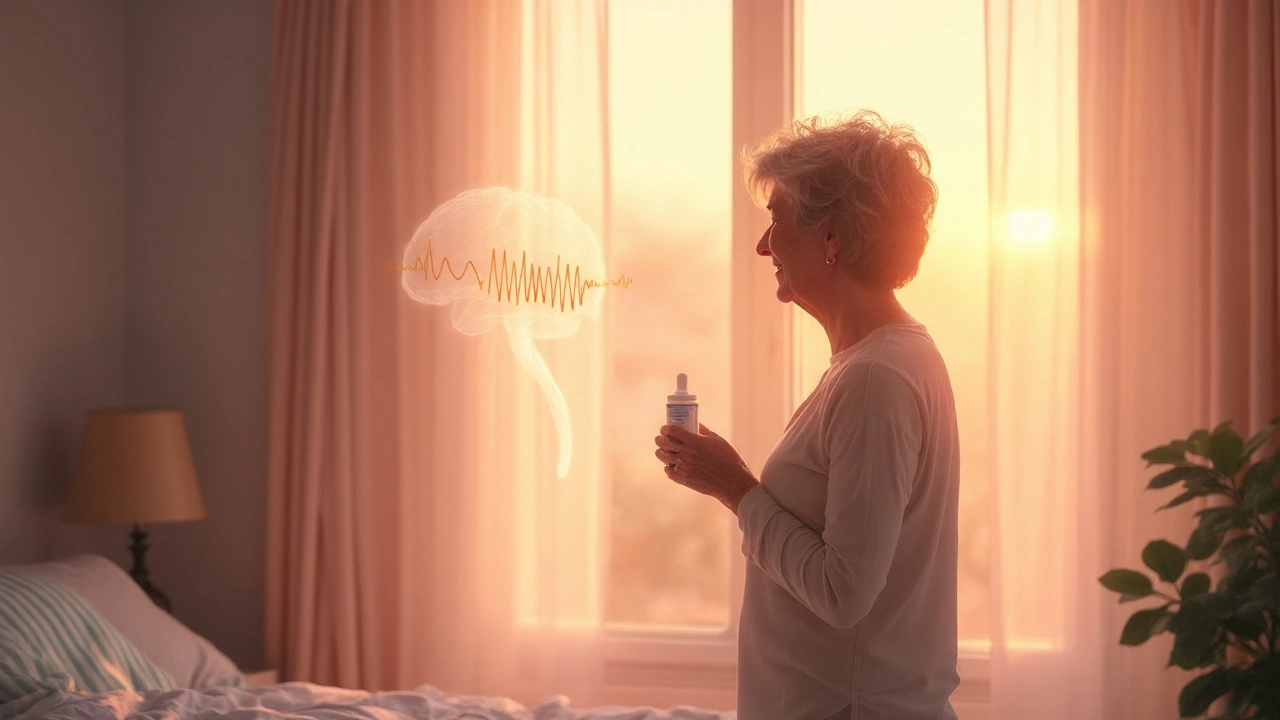Pristiq Explained: Uses, Dosage, Side Effects & What You Need to Know
 Sep, 21 2025
Sep, 21 2025
TL;DR
- Pristiq (desvenlafaxine) is a prescription antidepressant used for major depressive disorder.
- Typical adult dose starts at 50mg once daily; doctors may adjust up to 100mg.
- Common side effects include nausea, dizziness, dry mouth, and insomnia; most improve within two weeks.
- Never stop abruptly - taper under medical supervision to avoid withdrawal.
- Check interactions with other meds, especially SSRIs, MAOIs, and blood thinners.
What is Pristiq and how does it work?
Pristiq is the brand name for desvenlafaxine, a serotonin‑norepinephrine reuptake inhibitor (SNRI). By blocking the reabsorption of serotonin and norepinephrine, it boosts the levels of these mood‑regulating chemicals in the brain. The result is a reduction in depressive symptoms for many people.
The drug was approved by the FDA in 2008 and is now a common first‑line option for adults with major depressive disorder (MDD). In Australia, it’s listed on the Pharmaceutical Benefits Scheme (PBS), meaning many patients can get it subsidised.
Why choose Pristiq over other antidepressants? It has a relatively simple metabolism - the body converts it from its parent compound, venlafaxine, in a single step, which reduces drug‑to‑drug interaction risk for many patients. Still, it isn’t a magic bullet; effectiveness varies and a good therapist or support network remains essential.

Using Pristiq safely - dosage, side effects, and precautions
Getting the dose right is the first step to a successful treatment. Doctors usually start at 50mg taken once daily, with or without food. If symptoms don’t improve after 4‑6 weeks, the prescriber may increase to 100mg. Doses higher than 100mg haven’t shown extra benefit and may raise side‑effect risk.
Here’s a quick checklist to follow when you begin therapy:
- Take the pill at the same time each day to maintain steady blood levels.
- Set a reminder on your phone for the first few weeks.
- Keep a symptom diary - note mood changes, sleep patterns, and any new physical feelings.
- Report any severe nausea, vomiting, or signs of serotonin syndrome (fever, rapid heartbeat, agitation) to your doctor immediately.
- Don’t stop the medication without a taper plan; abrupt cessation can trigger withdrawal symptoms like electric‑shock sensations and irritability.
Common side effects are usually mild and tend to fade as your body adjusts. Below is a snapshot of the most frequently reported effects and how often they appear.
| Side Effect | Incidence | Typical Duration |
|---|---|---|
| Nausea | 15‑20% | First 2‑3 weeks |
| Dizziness | 10‑12% | Improves by week 4 |
| Dry mouth | 8‑10% | Persistent unless managed |
| Insomnia | 6‑9% | Weeks 1‑3, then stabilises |
| Sexual dysfunction | 5‑7% | Variable, may need dose tweak |
If side effects become intolerable, talk to your prescriber before making any changes. Sometimes a simple adjustment - taking the dose before bedtime, adding a low‑dose anti‑nausea med, or switching to a slow‑release formulation - can solve the problem.
Pristiq isn’t suitable for everyone. Avoid it if you:
- Have uncontrolled high blood pressure (the drug can raise systolic pressure).
- Are taking monoamine oxidase inhibitors (MAOIs) - a 14‑day washout is required.
- Have a history of bipolar disorder without a mood stabiliser, as antidepressants can trigger mania.
- Are pregnant or breastfeeding - discuss risks with your GP; data are limited.
Drug interactions matter too. Desvenlafaxine can increase bleeding risk when combined with NSAIDs, warfarin, or SSRIs. It also affects the metabolism of certain anti‑epileptics, so always hand over a full medication list during appointments.

Frequently asked questions and practical tips
Below are the questions patients tend to ask after a prescription, plus concise answers you can use to feel more confident.
- How long before I feel better? Most people notice a mood lift after 2‑4 weeks, but full benefits may take up to 8 weeks. Patience and regular follow‑ups are key.
- Can I drink alcohol while on Pristiq? Small amounts aren’t a strict no‑no, but alcohol can worsen side effects like drowsiness and dizziness. If you notice heightened sedation, cut back.
- What if I miss a dose? Take it as soon as you remember unless it’s almost time for the next dose. Then skip the missed one - don’t double up.
- Is there a generic version? Yes, desvenlafaxine is available as a generic tablet, often cheaper and still covered by the PBS.
- Will Pristiq affect my weight? Weight changes are rare, but some people report mild weight loss or gain. Keep an eye on food habits and discuss any sudden shifts with your doctor.
Here’s a quick decision tree for common scenarios:
- Experiencing severe nausea? - Try taking the pill with a light meal or switch to a bedtime schedule.
- Blood pressure spikes? - Ask your GP to monitor BP; a dose reduction or a different antidepressant may be needed.
- Feeling a “brain zaps” during taper? - Slow the taper further (e.g., reduce by 25mg every two weeks) and add a short‑term ADHD‑type stimulant under supervision.
Remember, medication is just one piece of the recovery puzzle. Pair Pristiq with regular exercise, sleep hygiene, and, if possible, psychotherapy such as CBT. The combination often yields the fastest and most durable improvements.
Finally, keep a copy of your prescription handy and schedule a follow‑up appointment within 4‑6 weeks of starting. Your doctor will assess response, adjust dosing, and address any concerns. Staying proactive helps you get the most out of your treatment.

JOANNA WHITE
September 21, 2025 AT 03:56Been on desvenlafaxine for 18 months. Nausea was brutal at first but took it with a banana at bedtime and it vanished. Sleep improved too. No brain zaps when I tapered slow - 25mg every 3 weeks. Generic works just as well. Also, CBT + this med = life changer.
Cameron Perry
September 21, 2025 AT 16:30Anyone else get dry mouth so bad you feel like you swallowed sand? I started chewing sugar-free gum and it’s the only thing that helps. Also, weirdly, my taste buds changed - everything tastes metallic now. Not sure if that’s normal.
erin orina
September 22, 2025 AT 18:49You’re not alone 😊 I had the same dry mouth thing - sipping water constantly, using Biotene spray, and avoiding caffeine. It sucks but it gets better. You’re doing great just by sticking with it 💪
Alyssa Hammond
September 22, 2025 AT 21:51This whole thing is just Big Pharma’s way of making people dependent on pills while ignoring real trauma. Everyone’s just medicating their problems instead of facing them. You think a chemical imbalance is why you’re sad? Nah. You’re sad because society is broken and no pill fixes that. I’ve been off antidepressants for 5 years and I’m finally free. You’re not broken. The system is.
And don’t even get me started on how they push these meds to teens like they’re candy. My cousin was put on this at 16 and now she can’t function without it. They didn’t even do therapy. Just write a script and send you on your way. Pathetic.
And the ‘taper slowly’ advice? That’s just so they can keep you hooked longer. Why not just go cold turkey? Your body will adapt. It’s stronger than they want you to believe. I did it. You can too. Stop listening to doctors who get paid by drug companies.
Also, the ‘side effects fade’ line? That’s a lie. Dry mouth lasted me 14 months. Insomnia never went away. I had to quit. I’m happier now, even if I’m ‘not medicated.’
And the PBS subsidy? That’s just a trap. They want you to think it’s affordable so you’ll stay on it longer. Wake up. The real cure is community. Connection. Not a tablet.
Jill Amanno
September 23, 2025 AT 08:30Wow. So you’re telling me that depression is a social construct and not a neurochemical reality? That’s cute. I’ve had depression since I was 14. I’ve tried therapy, yoga, journaling, sunlight, and cold showers. None of it worked. Then I tried this drug. Suddenly I could get out of bed. Suddenly I could talk to people. Suddenly I didn’t feel like I was drowning in tar every morning.
You want to talk about trauma? Fine. But trauma doesn’t magically disappear because you stop taking a pill. It just gets buried under layers of denial and bad coping mechanisms. I’m not ‘brainwashed by Big Pharma.’ I’m someone who finally found a tool that works. And if you’re too proud to use one, that’s your problem.
Also, the ‘they pay doctors’ argument is lazy. My doctor didn’t even prescribe it first - I asked for it after reading the science. He was skeptical. He asked me to track my mood. He wanted data. He didn’t push it. So don’t project your paranoia onto everyone.
And ‘community’? I live alone. I work remotely. I have zero friends. What community? The internet? This subreddit? You think posting a rant about Big Pharma is community? That’s not connection. That’s performance.
Maybe your healing is spiritual. Mine is pharmacological. Neither makes me a bad person. Stop trying to shame people into your ideology.
Frederick Staal
September 24, 2025 AT 03:32It's interesting how the article casually presents pharmacological intervention as a neutral, evidence-based solution without addressing the epistemological framework underpinning the biomedical model of depression. The assumption that mood dysregulation is reducible to neurotransmitter concentrations is a reductive Cartesian fallacy that ignores the phenomenological lived experience of affective disorders. Moreover, the normalization of long-term SSRI/SNRI usage within public health frameworks reflects a broader neoliberal tendency to commodify emotional distress into administrable, market-compliant units of care. The PBS listing, while ostensibly beneficial, functions as a mechanism of biopolitical control - incentivizing compliance through economic subsidy rather than fostering holistic therapeutic ecosystems. The absence of any critical discourse regarding the pharmaceutical industry’s role in shaping diagnostic criteria (e.g., DSM revisions) is not an oversight - it is a deliberate erasure.
Furthermore, the suggestion that 'CBT + medication yields the fastest improvement' implicitly validates a dualistic therapeutic hierarchy wherein pharmaceutical intervention is positioned as the primary modality and psychotherapy as an adjunct. This ontological privileging of the chemical over the cognitive undermines the agency of the patient as a meaning-making subject. One must ask: who benefits from this paradigm? The patient? Or the shareholders of Pfizer?
And let us not ignore the epistemic violence inherent in labeling a human being’s grief, alienation, or existential crisis as a 'chemical imbalance' - a phrase that has become a modern-day exorcism ritual. The real tragedy is not the suffering - it is the institutionalized refusal to interrogate the structures that produce it.
Tammy Cooper
September 25, 2025 AT 10:46Bro, you just wrote a 12-paragraph philosophy thesis on a Reddit post about antidepressants 😭 I came here for tips on how to stop puking after my pill, not a lecture on neoliberal biopower. Can we just… take the pill and go to bed?
Taylor Smith
September 26, 2025 AT 05:15Thanks for the detailed info. I’ve been on 50mg for 3 weeks. Nausea’s still there but way less. I take it right after dinner now and it helps. Also, I didn’t know the generic was covered by PBS - that’s good to know. I’m in the US so it’s pricey. Anybody know if the generic is the same as brand? No difference in how it works?
JOANNA WHITE
September 26, 2025 AT 18:23Same generic. No difference. I switched from brand to generic last year - same exact tablet, just different packaging. Saved me $120/month. FDA says they’re bioequivalent. No drama. Just cheaper.
Lisa Uhlyarik
September 27, 2025 AT 11:29Why are we all just accepting this like it’s normal to be on a drug for the rest of our lives? You’re not a broken machine. You’re a soul in a broken world. Why are we so quick to medicate instead of asking why we’re so unhappy in the first place? I’ve been on this for 7 years. I’m not better. I’m just numb. And now I can’t sleep without it. That’s not healing. That’s dependency.
Peggy Cai
September 28, 2025 AT 11:00you think you’re the only one who’s been on this for years? i’ve been on it since 2017 and i’ve tried quitting 4 times. each time i get brain zaps so bad i think im having a stroke. i dont want to be on it but i dont want to feel like i’m falling apart either. so yeah. i take it. and im not ashamed. you dont know what it’s like until you’ve lived it
Kate Calara
September 29, 2025 AT 09:16Did you know that desvenlafaxine was originally developed by Wyeth which got bought by Pfizer? And that the FDA approved it based on a study where the placebo group improved just as much as the drug group? And that the only reason it’s on the market is because they rebranded venlafaxine as a new drug to extend the patent? They didn’t even do a new clinical trial. Just repackaged the old one. And now you’re all thanking them for saving you? It’s a scam. You’re being played. The side effects? That’s just the price of being a lab rat.
Chris Jagusch
September 29, 2025 AT 13:25Why are you all talking about this like its some american thing? In Nigeria we dont even have access to this stuff. My cousin in Lagos got depression and they gave him bitter herbs and prayers. He’s better now. No pills. No therapy. Just faith. You guys are too soft. You think you need chemicals to feel okay? We survive war, poverty, and corruption with no meds. You need to get stronger. This is weak. Stop taking pills and go work out. Or pray. Or both.